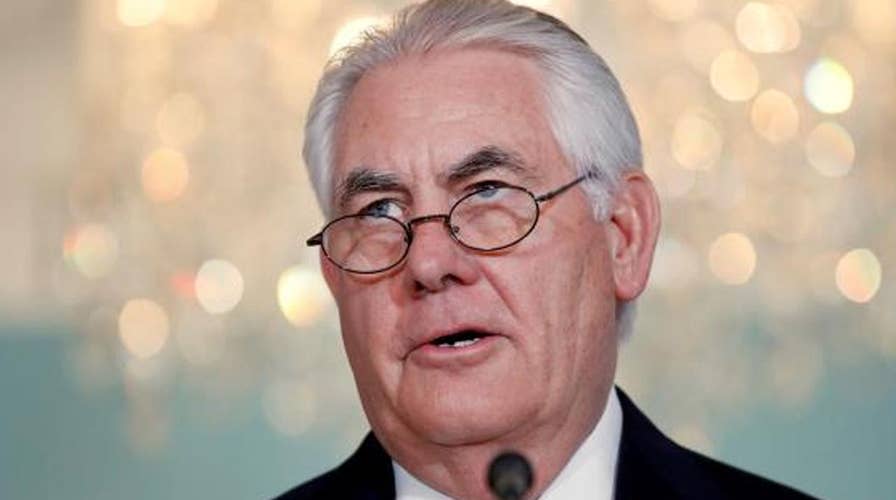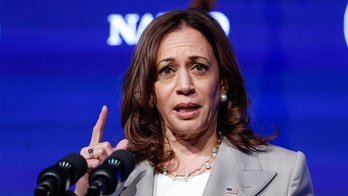Tillerson urges Saudi Arabia to ease blockade on Qatar
President Trump also called on Qatar to end its alleged ties to terrorism; Rich Edson has the story for 'Special Report'
President Trump again singled out Qatar as a financer of extremists at a White House press conference with the president of Romania.
“I decided along with Secretary of State Rex Tillerson, our great generals and military people, the time had come to call on Qatar to end its funding. They have to end that funding,” he said. “For Qatar, we want you back among the unity of responsible nations.”
His remarks followed the president’s Tuesday tweets that said “So good to see the Saudi Arabia visit with the King and 50 countries already paying off. They said they would take a hard line on funding...” and “...extremism, and all reference was pointing to Qatar. Perhaps this will be the beginning of the end to the horror of terrorism!”
The president called out no other countries, although he suggested others also should improve in attempting to combat terrorist financing.
“I won’t name other countries,” Trump said. “But we are not done solving the problem, but we will solve that problem.”
In a region with governments long accused of supporting various extremist groups, Saudi Arabia, the United Arab Emirates, Bahrain, Egypt and others have severed diplomatic and economic ties with Qatar over what they say is Qatar’s financing of terrorists.
“Qatar can no longer have it both ways,” said Yousef al-Otaiba, UAE’s ambassador to the United States, in a statement following the president’s remarks. “Qatar’s funding and ideological sponsorship are enabling the very extremists that American, UAE and other forces are fighting on the battlefield. The president is absolutely right, stopping funding for extremism means starting with Qatar.”
Hours before the president’s statement, Secretary of State Rex Tillerson offered a more measured assessment of Qatar.
“Qatar has a history of supporting groups that have spanned the spectrum of political expression, from activism to violence,” said the secretary. "The emir of Qatar has made progress in halting financial support and expelling terrorist elements from his country, but he must do more and he must do it more quickly."
In an interview with Fox News, Meshal Bin Hamad Al Thani, Qatar’s Ambassador to the United States, said he welcomes the secretary's remarks and said Qatar has prosecuted extremists.
"We have taken actions against individuals through our legal system,” said Al Thani. “There are on-going cases and we have, the courts have, concluded and prosecuted certain individuals."
To the president’s tweets, Al Thani would only say “Our cooperation with the United States speaks for itself. It's long standing. We are committed to it.”
While much of the administration’s rhetoric has focused on Qatar, Tillerson also called on Qatar’s neighbors to end their blockade.
“We are seeing shortages of food, families are being forcibly separated, and children pulled out of school. We believe these are unintended consequences, especially during this holy month of Ramadan, but they can be addressed immediately,” Tillerson said. “The blockade is hindering U.S. military actions in the region and the campaign against ISIS.”
“While current operations from Al Udeid Air Base have not been interrupted or curtailed, the evolving situation is hindering our ability to plan for longer-term military operations,” he said.
Capt. Jeff Davis, a Pentagon spokesman, said: “Qatar remains critical for coalition air operations in the fight against ISIS and around the region.”
With about 11,000 military personnel, Al Udeid Air Base is the largest U.S. military installation in the Middle East and the forward headquarters of CENTCOM.
Nearby Bahrain has also severed ties with Qatar. It hosts the U.S. Fifth Fleet.
Tillerson said the administration is working with its sparring allies to resolve this diplomatic crisis and that the U.S. will support mediation efforts along with the emir of Kuwait.
“Our expectation is that these countries will immediately take steps to de-escalate the situation and put forth a good-faith effort to resolve their grievances they have with each other,” said Tillerson.





